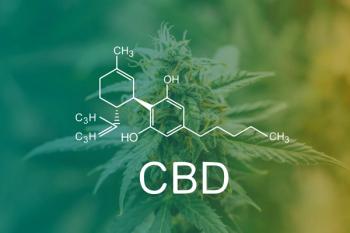
Cannabis Science and Technology
- October 2021
- Volume 4
- Issue 8
Exploring the Impact of Cannabis on the Human Brain, Heart, and Gut

Dr. Denise Vidot shares some of her research findings that examine the impact of phytocannabinoids on multiple diseases.
For this month’s installment of “Cannabis Crossroads,” I sat down with Dr. Denise Vidot, Assistant Professor at the School of Nursing and Health Studies at the University of Miami. Her epidemiology research aims to provide evidence on the health impact of phytocannabinoids. Dr. Vidot has been a leader in evidence-based research and collaborative studies. She leads a multidisciplinary team that examines the impact of phytocannabinoids on multiple diseases. Dr. Vidot is also the Founder and President of CanaVee, a nonprofit organization that allows her to help patients outside of the academic setting.
COVID-19 attacks the lungs, but many medical cannabis patients continue to smoke or vape cannabis products (according to your survey). What are the risks here and won’t damage from COVID potentially persist for long periods of time?
Yes, COVID-19 impacts the lungs; therefore, any type of smoking can further irritate lungs. Results from our team’s International COVID-19 Cannabis Health Study suggest that a proportion of cannabis smokers pre-pandemic have switched to non-combustible consumption methods. For those who remain smokers, the potential risk is in the byproducts of smoking, potential additives (especially in vape products), and persistent irritation to lungs that are already working harder if COVID-19 positive.
At the Cannabis Science Conference in Baltimore, you started your presentation by talking about the impact of cannabis on the brain, heart, and gut independently. Can you please share this information with our readers?
My presentation was focused on how cannabis can influence human health through key organs, such as the brain, heart, and gut. I shared that the reason cannabis can impact these organs is due to the endocannabinoid system that is in our body and responsible for homeostasis. The brain, heart, and gut independently have receptors that are part of the endocannabinoid system called CB1 and CB2 receptors. Research has identified specific phytocannabinoids (cannabinoids found in the cannabis plant) that engage with these receptors. The ability for phytocannabinoids to engage with the CB1 and CB2 receptors is the reason cannabis can either have a positive or negative impact on these organs. A well-documented example is comparing how tetrahydrocannabinol (THC) and cannabidiol (CBD)—two of the most studied phytocannabinoids—engage with the brain. THC has been shown to bind directly to CB1 receptors which are highly concentrated in the brain, thus the “psychoactive effect” associated with THC. CBD has not been shown to bind directly to CB1 receptors in the same way as THC, thus it does not have the same “psychoactive” effect as THC; though, there is still activity with CB1 receptors so one cannot definitively say there are no “psychoactive effects.”
Can you explain your laboratory’s epidemiological evidence-based hypotheses regarding how cannabis engages with the brain-heart-gut axis? Which chronic diseases are impacted?
The scientific community and literature are in agreement regarding the importance of the brain-gut axis; however, evidence is growing indicating the significance of the heart with the axis. Our laboratory has been conducting observational research over the past 10 years examining the impact of cannabis use on subclinical cardiovascular disease risk, mental health, and the gut microbiome independently. Our preliminary evidence led us to the hypothesis that the health of the brain-heart-gut axis is associated with chronic disease status. Specifically, we examined the impact of cannabis on the following chronic diseases and found differences in the axis by cannabis use: HIV, cancer, diabetes, and most recently COVID-19.
What is your laboratory looking at for the future? What are the next areas that you are interested in exploring?
We are very interested in continuing to follow epidemiologic steps in methodology. To date, we have conducted cross-sectional, case-control, and cohort studies (all observational). The next step is to obtain US Food and Drug Administration (FDA) approval to conduct randomized control trials to better test our hypotheses. During our COVID-19 studies, we also saw an increase in the prevalence of psilocybin and cannabis co-use. Study participants report the co-use to manage mental health specifically amid the pandemic. Our laboratory has been studying psychedelics indirectly, but have now designed and launched studies to more closely examine what has been reported by study participants. I am most excited about exploring how the co-use of cannabis and psychedelics may impact the brain-heart-gut axis in the context of chronic disease.
Can you tell us more about CanaVee (and any other initiatives that our readers should be aware of)? Any other final comments that you wish to share?
CanaVee is a non-profit organization I founded based on the reality I was seeing in our community: patients did not have access to evidence-based information regarding the health impact of cannabis use. The organization provides educational resources to patients and caregivers to help clarify what is known about cannabis and health. We also provide webinars and educational talks to groups.
As a final comment, I would like to encourage readers to read more about the endocannabinoid system. This is a system I never learned about formally in any of my education. Had I learned about this while obtaining my doctoral degree, I strongly believe my laboratory’s science would be more robust. This is the system that was the premise behind our Herbal Heart Study. More information about our laboratory’s ongoing NIH-funded study can be found at
I want to thank Dr. Vidot for sharing her research foci with us. This research truly helps us better understand the relationship between cannabis and cardiovascular disease risk based on how cannabis is consumed and we look forward to future epidemiological studies.
About the Interviewee
Dr. Denise C. Vidot is a cannabis epidemiologist at the University of Miami where she is Founder of the International Cannabis Research Collaborative. Her research focuses on the biological, psychosocial, and societal implications of cannabis by providing evidence on the impact of phytocannabinoids on human health via the endocannabinoid system.
ABOUT THE COLUMNIST
Josh Crossney is the columnist and editor of “Cannabis Crossroads” and a contributing editor to Cannabis Science and Technology magazine. Crossney is also the president and CEO of CSC Events.
Direct correspondence to:
How to Cite this Article
J. Crossney, Cannabis Science and Technology 4(8), 42-43 (2021).
Articles in this issue
over 4 years ago
Cultivation Breakthroughs for a More Uniform Plant Are Comingover 4 years ago
The Rise of In-line Color RemediationNewsletter
Unlock the latest breakthroughs in cannabis science—subscribe now to get expert insights, research, and industry updates delivered to your inbox.




